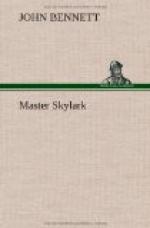There were two galleries above. They ran all around the inside of the building, like the porches of the inn at Coventry, and he could see them across the house. There were no windows in the gallery where he was, but there were some in the second one. They looked high. He went on around the gallery until he came to some steps going down into the open space in the center of the building. The stage was already set up on the trestles, and the carpenters were putting a shelter-roof over it on copper-gilt pillars; for it was beginning to drizzle, and the middle of the play-house was open to the sky.
The spectators were already coming into the pit at a penny apiece, although the play would not begin until early evening. Those for the galleries paid another penny to a man in a red cloak at the foot of the stairs where Nick was standing. There was a great uproar at the entrance. Some apprentices had caught a cutpurse in the crowd, and were beating him unmercifully. Every one pushed and shoved about, cursing the thief, and those near enough kicked and struck him.
Nick looked back. Carew and the manager had gone into the tiring-room behind the stage. He took hold of the side-rail and started down the steps. The man in the red cloak looked up. “Go back there,” said he, sharply; “there’s enough down here now.” Nick went on around the gallery.
At the back of the stage were two doors for the players, and between them hung a painted cloth or arras behind which the prompter stood. Over these doors were two plastered rooms, twopenny private boxes for gentlefolk. In one of them were three young men and a beautiful girl, wonderfully dressed. The men were speaking to her, but she looked down at Nick instead. “What a pretty boy!” she said, and tossed him a flower that one of the men had just given her. It fell at Nick’s feet. He started back, looking up. The girl smiled, so he took off his cap and bowed; but the men looked sour.
At the side of the stage was a screen with long leather fire-buckets and a pole-ax hanging upon it, and behind it was a door through which Nick saw the river and the gray walls of the old Dominican friary. As he came down to it, some one thrust out a staff and barred the way. It was the bandy-legged man with the ribbon in his ear, Nick looked out longingly; it seemed so near!
“Master Carew saith thou art not to stir outside—dost hear?” said the bandy-legged man.
“Ay,” said Nick, and turned back.
There was a narrow stairway leading to the second gallery. He went up softly. There was no one in the gallery, and there was a window on the side next to the river; he had seen it from below. He went toward it slowly that he might not arouse suspicion. It was above his head.
[Illustration: “NICK PUT ONE LEG OVER THE SILL AND LOOKED BACK.”]
There were stools for hire standing near. He brought one and set it under the window. It stood unevenly upon the floor, and made a wabbling noise. He was afraid some one would hear him; but the apprentices in the pit were rattling dice, and two or three gentlemen’s pages were wrangling for the best places on the platform; while, to add to the general riot, two young gallants had brought gamecocks and were fighting them in one corner, amid such a whooping and swashing that one could hardly have heard the skies fall.




